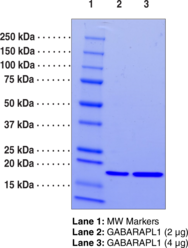Territorial Availability: Available through Bertin Technologies only in France
- Correlated keywords
- Early Estrogen-Regulated ATG-8 Glandular Epithelial Cell GEC-1 GEC1 gabarapl-1 NBR MDAMB231 Escherichia
- Product Overview:
GABAA receptor-associated protein-like 1 (GABARAPL1) is a protein encoded by the GABARAPL1 gene in humans and is a member of the GABARAP family of proteins.{48027} It contains a ubiquitin-like core of ?-sheets and ?-helices, with two additional ?-helices at the N-terminus.{48028} The GABARAPL1 gene is expressed in a variety of tissues, including the brain, heart, liver, kidney, and placenta, among others, and the protein is highly expressed in the brain and the lungs.{48027} GABARAPL1 interacts with tubulin and the ?2 subunit of the GABAA receptor and promotes tubulin polymerization and microtubule formation.{48027} It also interacts with the ?-opioid receptor to increase receptor expression in the plasma membrane. GABARAPL1 is involved in autophagy where it interacts with the autophagy cargo adaptor proteins p62 and NBR1 to facilitate degradation of ubiquitinated protein aggregates.{48029,48027} The GABARAPL1 gene contains potential estrogen regulatory elements, and GABARAPL1 expression is higher in breast adenocarcinoma tumors from lymph node-positive patients that had a lower risk of metastasis. However, GABARAPL1 expression is upregulated in patient-derived triple negative breast cancer (TNBC) tissue and inhibition of its activity in an MDA-MB-231 mouse xenograft model suppresses cell proliferation, tumorigenesis, and metastasis.{48030}
Cayman Chemical’s mission is to help make research possible by supplying scientists worldwide with the basic research tools necessary for advancing human and animal health. Our utmost commitment to healthcare researchers is to offer the highest quality products with an affordable pricing policy.
Our scientists are experts in the synthesis, purification, and characterization of biochemicals ranging from small drug-like heterocycles to complex biolipids, fatty acids, and many others. We are also highly skilled in all aspects of assay and antibody development, protein expression, crystallization, and structure determination.
Over the past thirty years, Cayman developed a deep knowledge base in lipid biochemistry, including research involving the arachidonic acid cascade, inositol phosphates, and cannabinoids. This knowledge enabled the production of reagents of exceptional quality for cancer, oxidative injury, epigenetics, neuroscience, inflammation, metabolism, and many additional lines of research.
Our organic and analytical chemists specialize in the rapid development of manufacturing processes and analytical methods to carry out clinical and commercial GMP-API production. Pre-clinical drug discovery efforts are currently underway in the areas of bone restoration and repair, muscular dystrophy, oncology, and inflammation. A separate group of Ph.D.-level scientists are dedicated to offering Hit-to-Lead Discovery and Profiling Services for epigenetic targets. Our knowledgeable chemists can be contracted to perform complete sample analysis for analytes measured by the majority of our assays. We also offer a wide range of analytical services using LC-MS/MS, HPLC, GC, and many other techniques.
Accreditations
ISO/IEC 17025:2005
ISO Guide 34:2009
Cayman is a leader in the field of emerging drugs of abuse, providing high-purity Schedule I-V Controlled Substances to federally-licensed laboratories and qualified academic research institutions for forensic analyses. We are certified by ACLASS Accreditation Services with dual accreditation to ISO/IEC 17025:2005 and ISO Guide 34:2009.





